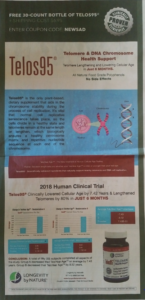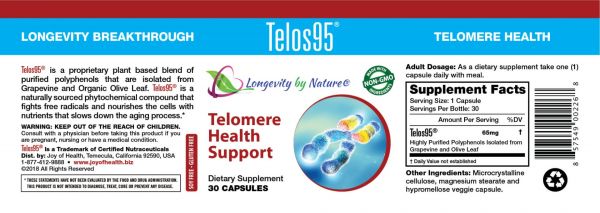Industry-funded study of the week: a live-forever dietary supplement
When I saw this ad in last Thursday’s New York Times, I immediately clipped it out.
 What is this?
What is this?
It is an ad for a dietary supplement, Telos95, with a classic structure/function claim (a type invented for dietary supplements of less-than-established efficacy): “telomere & DNA chromosome health support—-telomere lengthening and lowering cellular age in just 6 months.”
Telos95 is the only plant-based dietary supplement that aids in the chromosome stability during the process of cell replication. It’s vital that normal cell replicative senescence takes place, so the cells divide in a healthy state and telomeres remain at the same length or lengthen, which biologically ensures a health centrosome matrix and repetitive nucleotide sequence at each end of the chromosome.
Got that?
What’s with telomeres?
All of this refers to work that got a Nobel Prize for Elizabeth Blackburn, Carol Greider, and Jack Szostak in 2009. They showed that telomeres, caps on the end of chromosomes, protect chromosomes from degradation. Shorter telomeres are associated with cell aging.
What got my attention in this ad was its report of a 2018 clinical trial finding that this supplement reduced cellular age by more than 7 years.
Really? I had some immediate questions.
What’s in the supplement?
The ad doesn’t say anything other than “all natural food grade polyphenols.” But I managed to find a Supplement Facts Label online.

Highly purified polyphenols extracted from grape and olive leaves?
These, by the way, cost about $100 for 30 capsules.
Whatever.
What’s the study?
I was able to find it online: A randomized-controlled clinical study of Telos95® , a novel antioxidative dietary supplement, on the shortening of telomere length in healthy volunteers
It’s in a journal I’ve never heard of previously: HealthMed, published in Bosnia and Herzogovina
The report of the study starts out rather peculiarly:
The objective of this study was to determine the deodorant effectiveness of a dietary supplement to halt the shortening of telomere length as measured through blood samples before and after product use.
Deodorant? Maybe something is lost in translation here?
Who paid for the study?
The published paper doesn’t say. It does, however, refer to a Sponsor responsible for the study’s protocols, safety evaluation of the products, and safety indemnification of Princeton Consumer Research Corp (PCR), the group that carried out the study.
PCR’s website, by the way, states that “PRINCETON CONSUMER RESEARCH IS NOT AFFILIATED IN ANY WAY TO PRINCETON UNIVERSITY”. Whew.
PCR’s press release credits Certified Nutritionals as behind the study.
What is this all about?
The Daily Beast did an investigative report on something similar a couple of years ago.
Obviously, this is about selling a supplement made from rice at profits so great that Longevity by Nature can afford a full-page ad in the Times (these used to run in the $80,000 range, if not more).
It is also about the use of industry-sponsored research to sell products: the sponsored study –> press release –> huge advertisement –> increased product sales.
Will this product keep your telomeres from shortening? If only.

